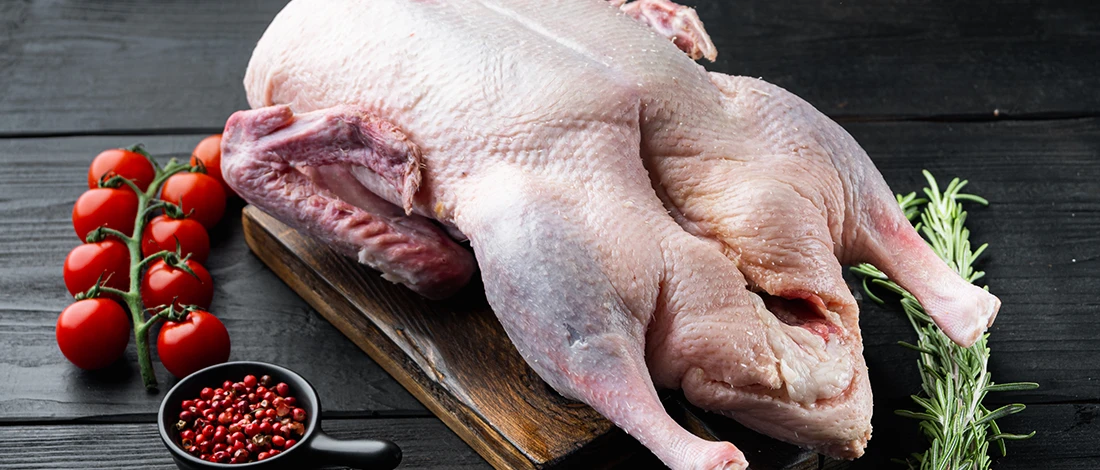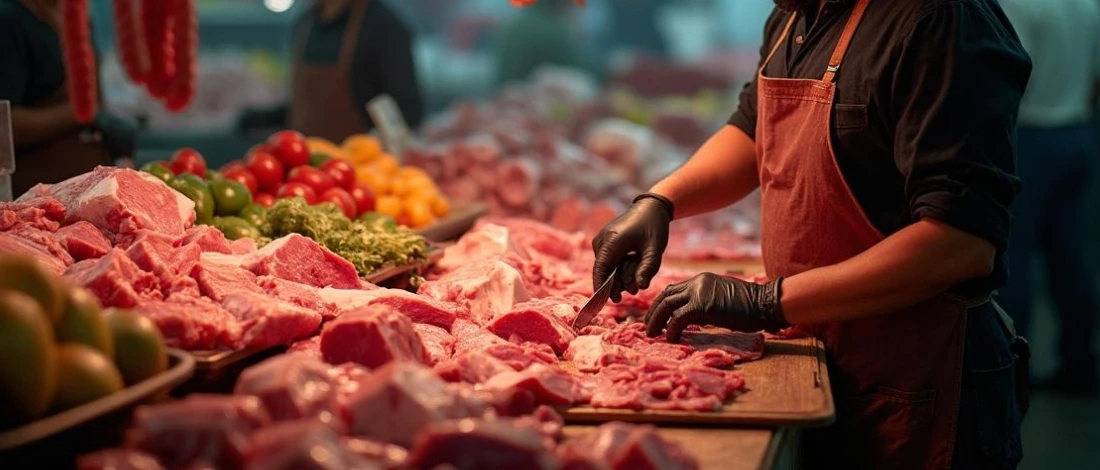I've been a big fan of deli meats since childhood, and I've eaten countless amounts since I started my carnivore lifestyle a decade ago.
At Carnivore Style, we appreciate how deli meats add variety and convenience to a meat-based diet, from turkey sandwiches to pepperoni and chicken rolls.
Having sampled an array of deli meats, I appreciate their complexity and variety.
Today, I'll explain everything you should know about cold cuts, including their contents, types, and potential impact on your health. Read on to learn more.
Quick Summary
- Deli meat is pre-cooked or cured meat that is sliced as served either hot or cold.
- Lunch meats can be beef, pork, turkey, fresh chicken, or a mix of different meats.
- Deli counter meat contains meat additives and isn’t very healthy.
What’s Deli Meat?

Deli meat is fresh or canned meat that’s precooked. It’s also called cold cut, cooked meat, or lunch meat and is usually available as loaves, canned, sliced, or pre-packed in vacuum packages.
Deli meats can be divided into three categories:
Freshly cooked Deli Meats
These are pieces of freshly cooked and flavored meat with salt and spices. The most common fresh deli cut is baked turkey or roasted beef.
Moderately processed Deli Meats
These are pieces of excess meat removed from the bone and then ground. When the meat is ground, its emulsified into a batter to which flavors and additives are added. The meat is placed in a cylindrical package or in a mold to be moved to the smokehouse, where it’s cooked for several hours, after which it’s packaged as one piece or sliced.
Very processed Deli Meats
These meats go through a similar process as moderately processed meats. This is a mix of beef, veal, turkey, or chicken. The meat is ground to reach consistency, blended to a paste, emulsified, and added preservatives and sugar.
The meat is then cased into a shape and moved to the dripping room, where it’s aged for a few days, cooked, and smoked. Finally, the meat is packaged as one piece or sliced. An example is hot dogs and meat loaves.
Content of DELI MEAT?
Here’s what you can commonly find in deli meats:
- Sodium nitrate — Sodium nitrite can combine with amines, which is cancerogenic. That’s why the World Health Organization classified processed meats as Class 1 carcinogen, so this isn’t the best of ingredients [1].
- Sodium— Sodium is added during meat processing for better taste and longer shelf life. Sodium can include salt, sodium nitrite, and sodium erythorbate. Because of this, many deli meats have a high amount of sodium.
- Fats — Deli cuts that are a combo of meats, for example, pork and beef, are high in saturated fats.
- Other ingredients — Other common ingredients deli counter meats have are sugar, natural flavors, emulsifiers, gelation, modified food starch, and others, many of which have potential health risks.
You Might Also Like: How Long Is Deli Meat Good For?
Types of Deli Meat

These are the most common types of deli counter meat:
- Chorizo — Cured Spanish sausage, usually made from pork, black pepper, garlic, and paprika. It has a red color and a strong flavor. You can eat chorizo raw or cooked.
- Prosciutto — Comes from the pork leg. The meat is salted and then left to age in a cold climate for about a year.
- Ham — Comes from pork leg. This is cured meat. Nowadays, ham is usually wet cured, which means it’s treated with salt before cooking. This makes canned hams moist.
- Pepperoni — Is a spicy, cured sausage. It can be made from pork or beef or a mix of both. Pepperoni is most commonly used on a pizza. You can keep it in the fridge for about two weeks.
- Chicken Roll — It is made from chicken meat with seasonings. It can be added to sandwiches or used as lunch meat. You can chop the chicken rolls and use them in salads or as pizza toppings.
- Salami — Is cured sausage made from pork or beef with herbs and spices. Salami goes through a process of salting, drying, and occasionally smoking. It’s commonly used on pizzas and sandwiches.
- Chicken Breast — Comes from whole chicken breast fillets. You can buy sliced or shaven chicken breast. It’s commonly used in wraps and sandwiches.
- Turkey Breast — This is pure turkey breast meat roasted in the oven. It’s fat-free, so it’s healthy lunch meat. Turkey breast is often used in sandwiches and wraps, but you can also add it to a salad or pizza.
- Beef Pastrami —Is made from corned beef with pepper and spices, which is then smoked for added flavor. You can find it at a deli counter as one of the popular deli cuts.
- Roast Beef — Is made from beef that’s roasted in the oven. You can also get lean roast beef if you’re watching your calorie intake. Use roast beef well-chilled, so you get the best flavor.
Most deli meats have a short shelf life and should be kept in the fridge for about two days.
Related Articles:
What Types of Deli Meats Are Not Processed?

While many deli meat options are processed, you can still find meats that are fresh and free from additives.
Some options to consider include the following:
- Freshly roasted meats, such as beef, turkey breast, chicken breast, and pork loin. These options contain no flavorings or additives.
- Organic lunch meat from turkey and chicken that are raised without antibiotics
- Grass-fed beef without artificial additives.
- Organic prosciutto containing only pork and salt.
- Serrano ham made with natural ingredients.
To ensure you get unprocessed deli meat, read labels to check the ingredient list for preservatives, additives, and sodium content.
“If your only option is prepackaged lunch meat, you’ll want to read the food label carefully, specifically the ingredients and what’s been added. Look for nitrates and nitrites-free and low-sodium options and make sure you understand the serving size.”
- Julia Zumpano, RD. for Harvard Health
You may also ask the customer service representatives how the meat is prepared and if it's free-off any additives.
Also Read: Can You Freeze Lunch Meat?
Health Implications of Deli Meat
Deli meats are convenient but associated with several health effects that users should consider.
If you’re a fan of this meat, you should be aware of the following health risks:
- Since deli meats are high in sodium, they can promote high blood pressure, increasing the risk of cardiovascular disease [2].
- Other than sodium, deli meats are also rich in preservatives, which can increase the risk of Type 2 diabetes by damaging cells involved in insulin production [3].
- The preservatives in deli meats like nitrites and nitrates are carcinogenic, increasing the risk of certain types of cancer, such as rectum and colon cancers, when consumed in large volumes. The International Agency for Research on Cancer (IARC) classifies processed meats as Group 1 carcinogens [4].
- Deli meats made from red meat, like bologna and salami, are filled with saturated fats, which can increase cholesterol levels [5].
- Like any other processed food, deli meats tend to be calorie-dense, a risk factor for weight gain when consumed in large amounts.
- Regarding food safety, deli meats are not entirely safe as they are susceptible to contamination, especially when handled inappropriately, a risk factor for foodborne illnesses [6].
Being aware of these health implications can keep you on the safer side.
FAQs
What is Considered Deli Meat?
Meat that’s considered deli meat is meat that’s cooked and sliced in food processors for a sandwich or lunch. It’s also called cold cuts, sliced meat, and lunch meat.
Are Deli Meats Healthy?
No, deli meats aren’t very healthy. Processed meat consumption means getting a lot of saturated fat, salt, and sodium, which can cause lifestyle diseases.
Can You Eat Deli Meat While Pregnant?
You shouldn’t eat deli meat while pregnant. These meats can have bacteria that are dangerous for pregnant women.
At Carnivore Style, we want to help you understand the foods you enjoy and how they fit into your lifestyle. Check out our other guides for more insights into quality meat options and healthy carnivore living.
References:
- https://www.who.int/news-room/questions-and-answers/item/
- https://www.ncbi.nlm.nih.gov/pmc/articles/PMC6490875/#
- https://www.texashealth.org/en/areyouawellbeing/Diabetes/Eating-These-Two-Things-Can-Increase-Your-Risk-of-Type-2-Diabetes#
- https://www.aicr.org/news/diet-cancer-experts-welcome-who-report-on-meat-and-cancer/#
- https://www.betterhealth.vic.gov.au/health/conditionsandtreatments/cholesterol-healthy-eating-tips
- https://www.cdc.gov/foodsafety/foods-linked-illness.html#poultry







